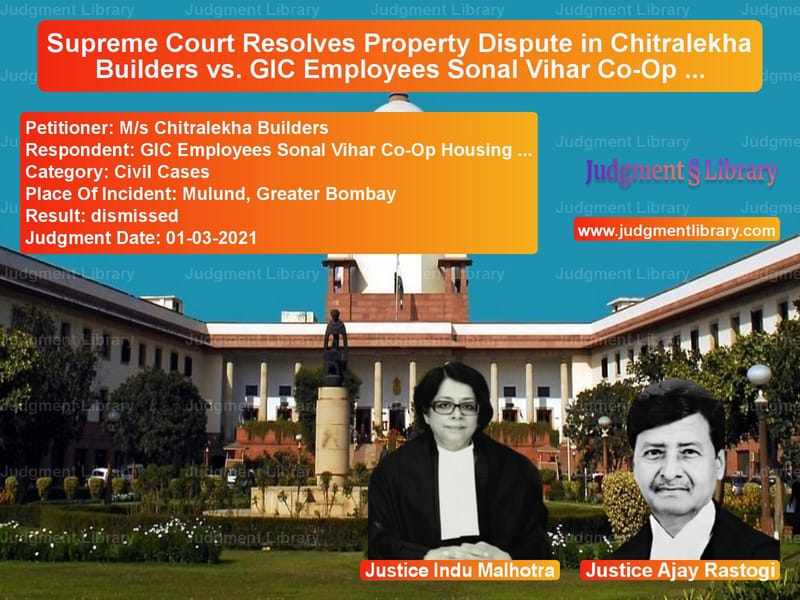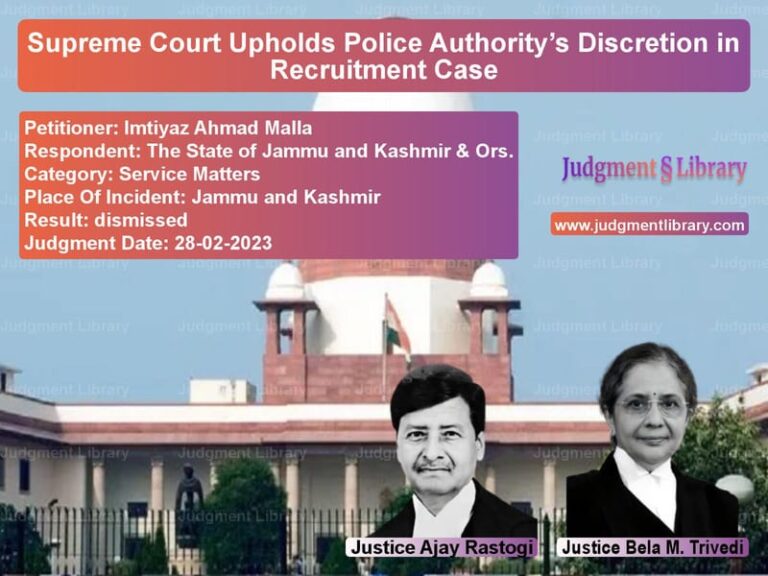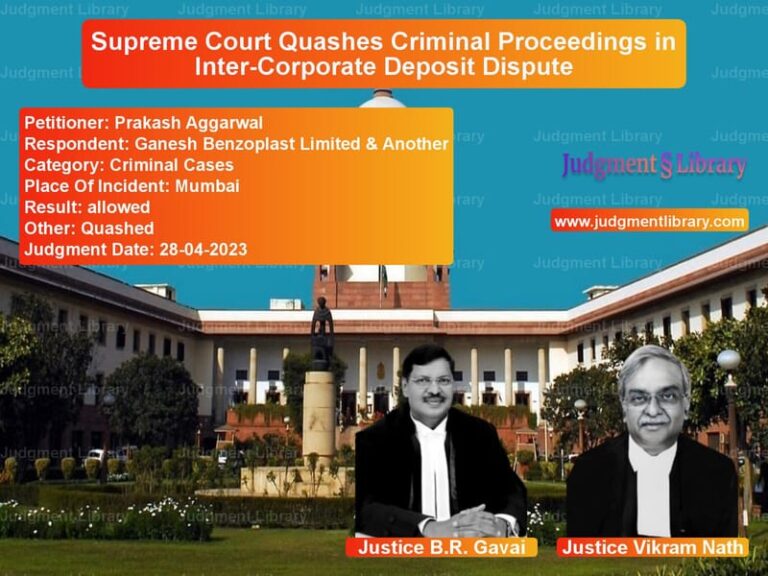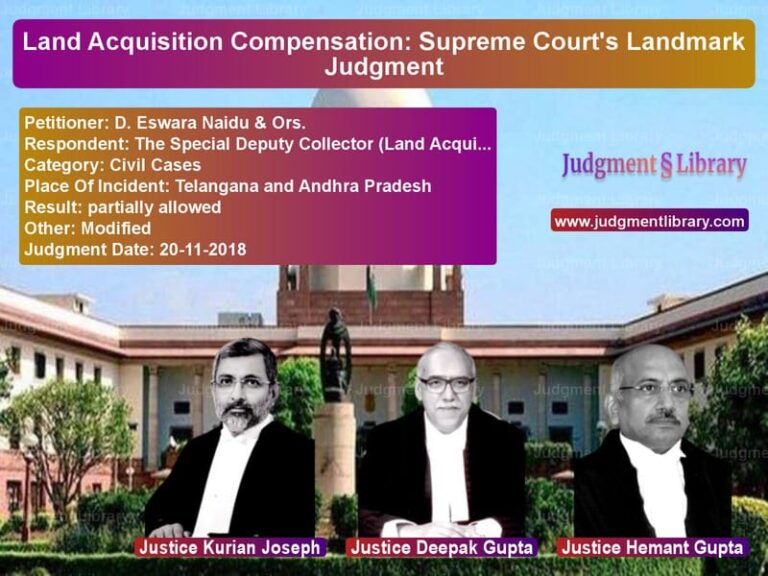Supreme Court Resolves Property Dispute in Chitralekha Builders vs. GIC Employees Sonal Vihar Co-Op Housing Society
The Supreme Court of India, in a significant ruling, resolved a long-standing property dispute involving M/s Chitralekha Builders and GIC Employees Sonal Vihar Co-operative Housing Society. The case revolved around the execution of an Agreement to Sell, subsequent ownership conflicts, and multiple legal challenges. The apex court ruled on the validity of consent decrees and the rights of parties in civil litigation.
Background of the Case
The dispute originated from an Agreement to Sell dated April 28, 1980, executed between the Vaity family and Chitralekha Builders for land measuring 5082 square yards in Mulund, Greater Bombay. The agreement required the Vaity family to execute a Deed of Conveyance in favor of Chitralekha Builders or its nominees upon payment of Rs. 35 lakhs.
Subsequently, on May 9, 1980, Chitralekha Builders entered into a development agreement with GIC Employees Sonal Vihar Co-operative Housing Society Ltd. (hereinafter referred to as “the Society”). The agreement stipulated that Chitralekha Builders would develop the property and hand over the constructed premises to the Society.
However, disputes arose when the Vaity family refused to hand over possession of the property and execute the sale deed. This led to the filing of Suit No. 1335/1988 before the Bombay High Court by the Society and one of the partners of Chitralekha Builders, seeking specific performance of the agreement.
Key Legal Developments
- During the pendency of the suit, Chitralekha Builders underwent reconstitution through a partnership deed dated April 8, 1989.
- In 1996, another partnership deed altered ownership interests.
- In 1991, the Bombay High Court appointed a court receiver to oversee the property.
Consent Decrees and Further Litigation
The case saw multiple consent decrees being passed:
- First Consent Decree (February 16, 2005): The Vaity family agreed to execute the conveyance deed in favor of one of the original plaintiffs, but Chitralekha Builders was not a party to these consent terms.
- Second Consent Decree (October 3, 2005): The Society entered into another settlement with Oswal Enterprises, effectively transferring property rights.
Chitralekha Builders, aggrieved by these decrees, filed Suit No. 3162/2005, seeking to declare these consent decrees void and illegal.
Petitioner’s Arguments (Chitralekha Builders)
- The consent decrees were executed behind their back, without their involvement, making them null and void.
- The firm had undergone multiple reconstitutions, and its partners, including the petitioners, were rightful stakeholders in the property.
- The conveyance deed executed under the consent terms was illegal and should be revoked.
- The litigation initiated by them was the only valid claim, and the High Court erred in dismissing their appeal.
Respondents’ Arguments (GIC Society and Oswal Enterprises)
- The consent decrees were valid, as they were executed between parties who held contractual rights.
- The petitioners had already been granted an opportunity to challenge the decrees in a separate suit.
- The appeal was not maintainable because the petitioners were not party to the original consent decree.
Supreme Court’s Observations
The Supreme Court made several critical observations:
- The consent decrees could not bind the petitioners if they were not party to the proceedings.
- The pending Suit No. 3162/2005 was the appropriate forum to determine the rights of the petitioners.
- Once a substantive suit was filed challenging the decrees, an independent appeal could not be entertained separately.
- The court noted procedural lapses in how property ownership disputes were settled in the consent terms.
The Court stated:
“Since the appellants were not a party to the proceedings, and the Order dated 16.02.2005 was passed on terms agreeable to the parties to the proceedings, it shall not be binding upon the appellants, and their rights could be examined independently in the substantive suit filed at their instance.”
Supreme Court’s Verdict
- The Supreme Court dismissed the appeal, directing the Bombay High Court to expedite proceedings in the pending suit.
- The rights of the petitioners were to be adjudicated in the separate suit they had filed.
- The court ensured that none of the observations in this judgment would prejudice the pending proceedings.
Impact of the Judgment
- Strengthening Due Process: The ruling reaffirms that parties not involved in consent decrees cannot be bound by them.
- Ensuring Fair Property Transactions: The judgment protects property owners from unauthorized settlements executed in their absence.
- Clarification on Legal Remedies: The decision clarifies the procedural approach for challenging consent decrees.
Conclusion
The Supreme Court’s judgment in Chitralekha Builders vs. GIC Employees Sonal Vihar Co-Op Housing Society is a significant ruling in property law. It underscores the importance of fair litigation and procedural due process in resolving disputes over real estate transactions. The ruling ensures that parties who are not signatories to settlements have legal recourse and are not unfairly bound by agreements executed without their participation.
Petitioner Name: M/s Chitralekha Builders.Respondent Name: GIC Employees Sonal Vihar Co-Op Housing Society Ltd. & Anr..Judgment By: Justice Indu Malhotra, Justice Ajay Rastogi.Place Of Incident: Mulund, Greater Bombay.Judgment Date: 01-03-2021.
Don’t miss out on the full details! Download the complete judgment in PDF format below and gain valuable insights instantly!
Download Judgment: ms-chitralekha-buil-vs-gic-employees-sonal-supreme-court-of-india-judgment-dated-01-03-2021.pdf
Directly Download Judgment: Directly download this Judgment
See all petitions in Contract Disputes
See all petitions in Property Disputes
See all petitions in Specific Performance
See all petitions in Landlord-Tenant Disputes
See all petitions in Damages and Compensation
See all petitions in Judgment by Indu Malhotra
See all petitions in Judgment by Ajay Rastogi
See all petitions in dismissed
See all petitions in supreme court of India judgments March 2021
See all petitions in 2021 judgments
See all posts in Civil Cases Category
See all allowed petitions in Civil Cases Category
See all Dismissed petitions in Civil Cases Category
See all partially allowed petitions in Civil Cases Category







